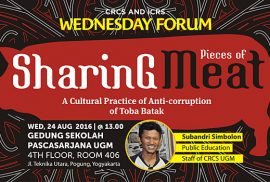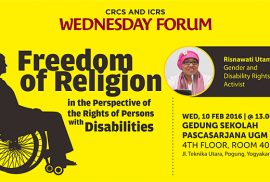
Abstract
Corruption is a problem of civilization which, by extension, is a problem of culture. This must be confronted by reviving the cultural values of anti-corruption. Learning from local traditions which combat corruption can be a powerful instrument to fix corrupt tendencies in a state. Strong beliefs in local cultural values can become the base of these efforts. In other words, the culture will create the people, and the people will create the civilization. Presenter try to offer an overview of Mambagi Jambar (Sharing Pieces of Meat) activity as representative of the cultural activities which combat corruption. By basing on ethnographic interviews and analysis of related texts, the presenter will describe this discussion in a systematic matter. The first part introduces global corruption and, furthermore, the issue of corruption in Indonesia. The second part describes the activities of padalan jambar juhut in Toba Batak culture. The last part then discusses these activities and their contributions in an effort to revive anti-corrupt cultural practices.
Speaker
Subandri Simbolon is Public education Staf at CRCS-UGM. His research, focused on culture and populer issue, has been published in globethic.net journal. He finished his BA at Sekolah Tinggi Filsafat dan Teologi (STFT) Widya Sasana Malang where he majored in Christian Philosophy. In 2014, he graduated from CRCS-UGM where focuse on Culture and Ecology. In 2014 and 2015, he awarded the first winner for globetthic.net essay competition about “Anti Corruption Ethics and Religiosity (2014) and “Responsible Leadership (2015)“.
Wedforum

Abstract
The freedom to express one’s beliefs and participate fully in one’s religious community is one of the fundamental human rights explicitly stated in the International Convention on Civil and Political Rights. However,in Indonesia like in many other countries, persons with disabilities are one of the groups excluded from enjoying their full human rights.
Two kinds of barriers keep person with disabilities from access houses of worship. Attitudinal barriers including misconceptions in the mindsets of religious leaders about the concept of disability, stigma and prejudice keep persons with disabilitesfrom contributing significantly to or even being involved in their religious communities. Environmental barriers resulting from design and architectural factors prevent persons with disabilities from physical access to the houses of worship and from exercising their spiritual needs equally with everyone else.
The paper will explore how disability is an evolving concept that results from the interaction between persons with impairment and the attitudinal and environmental barriers that hinders their full and effective participation in society on an equal basis with others. In addition, it will explore the policy review, strategies and recommendations based on the UN Convention on the Right of Persons with Disabilities’ ratification through Law number 19/2011 and local regulations/Perda number 9/2015 on the Protection and Fulfillment of the Rights of Persons with Disabilities in Bali Province that seek to ensure the right to freedom of religion is part of human rights of persons with disabilities.
Speaker
Risnawati Utami has been a gender and disability rights activist since 1999 and currently speaks throughout Indonesia and abroad advocating the rights of persons with disabilities and development within the United Nations Conference of State Parties to the Convention on the Rights of Persons with Disabilities. A graduate of the Faculty of Law, University of March 11, Solo,in 2006, she was awarded a Ford Foundation International Fellowship Program to earn Master Degree in International Health Policy and Management at Brandeis University, Massachusetts, USA. Currently, she works for OHANA, a non-profit organization in Yogyakarta which focuses on disability rights advocacy and policy studiesand actively promotes “disability inclusive development” in the Agenda 2030/Sustainable Development Goals at the local, national and global levels.



